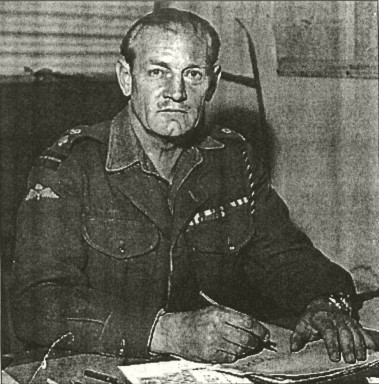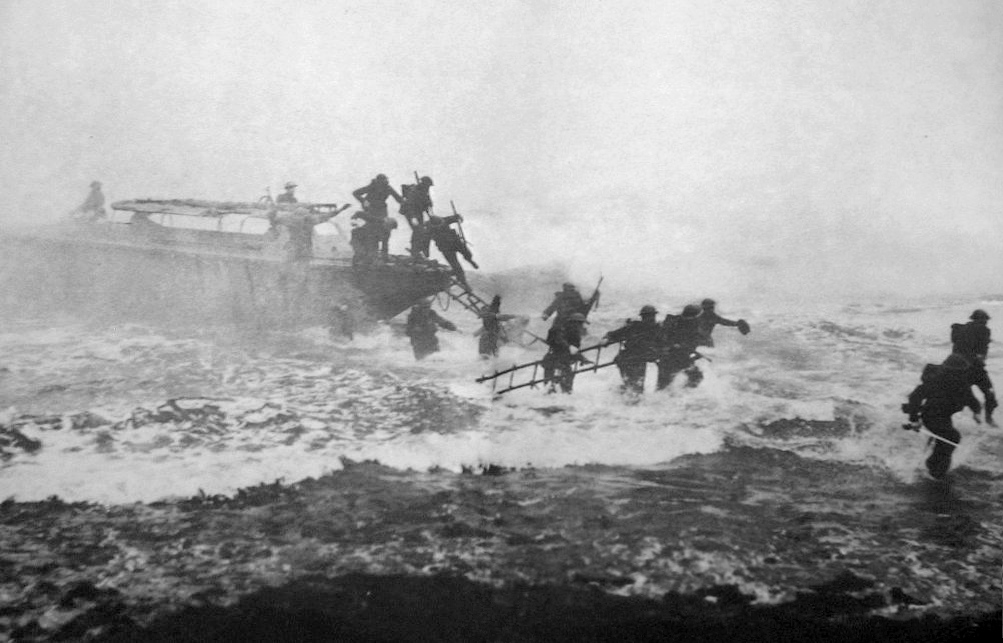“Any officer who goes into action without his sword is improperly dressed.” – Mad Jack Churchill

World War II swept down onto Europe. The nights were filled with bomber fire, the days with the rata-tata of machine guns. The last thing any German soldier would have expected was to hear the call of a bagpipe and see an arrow whistling through the smoke-filled air to cut down one of his buddies. The last thing anyone would expect would be to see a British soldier charging through no-man’s land, slashing left and right through the fray with a sword.
The British soldier’s name was Jack Churchill, known affectionately as “Mad Jack” by his comrades, and he fought his way through World War II against Nazi Germany armed with his bagpipes, a longbow, and a Scottish broadsword.
Early Life
Jack Churchill was born in the British colony of Ceylon, or what is now modern-day Sri Lanka on the 16th of September in 1906. He came from a long line of warriors. Both his father and grandfather served in the Ceylon Civil Service. After Churchill’s birth, his family returned to Surrey, in Britain, where his younger brother, Thomas, was born. In 1910, when Jack was four, the Churchills moved to Hong Kong when his father was appointed the Director of Public Works there. The family would later return to England in 1917, when Jack was about eleven.
Jack went to college at King William’s College on the Isle of Man. He graduated from the Royal Military College in Sandhurst a little later in 1926, making him a soldier by trade. Jack was appointed to the Manchester Regiment, and served in Burma. In his time of service, he was known for doing crazy things like taking a 1,500 mile motorbike trip from across Burma, and he even, reportedly, got into a fight with a very large and very hostile water buffalo, but made it back in time for dinner and to serve in the Burma Rebellion of 1930-32.
In 1936, he retired from the army and went to work as a newspaper editor in Nairobi, Kenya, and, of all things, as a male model. He worked part time as a movie star, too, proving there was no end to his talents. Jack was a restless and competitive spirit, and he took second place in a military bagpipe competition and, in 1939, he represented Great Britain at the World Archery Championships in Oslo, Norway.
World War II

In September, 1939, the Nazis crashed through Poland, and Jack Churchill went back to war. It started in France, in 1940, in May. Churchill and his unit, the Manchester Regiment, ambushed a German patrol. His son, Malcolm, told the story like this: “He and his section were in a tower and as the Germans approached he said ‘I will shoot that first German with an arrow,’ and that’s exactly what he did”. Mad Jack Churchill became the first and only British soldier to have felled an enemy with a longbow in World War II.
One year later, Jack Churchill was second in command in Operation Archery, a raid on the German garrison in Norway. As night fell on the 27th of December, and the ramps fell to the ground from the landing craft, Churchill was the first out of the bay. He sprinted forward, playing his blaring bagpipes to the tune of “March of the Cameron Men”. He threw a grenade, and, as it went off, he blazed into battle.
Mad Jack moved on to earn the Military Cross and Bar, and became a commanding officer of his own commandos. In July of 1943, while in Italy, with his broadsword slung around his waist, his arrows on his back, and his bagpipes under his arm, he infiltrated a Nazi post at Molina, captured it, and took 42 German prisoners.
The next year, in Yugoslavia, Mad Jack singlehandedly organized a motley army of 1,500 partisans, 43 commandos, and one troop from 40 Commando for the raid. Churchill’s bagpipes signaled them to battle, but they came under fire, and Churchill decided to withdraw and try again in the morning.
Captured by the Gestapo
The next morning, the battle did not go well. Churchill was knocked unconscious by grenades and captured and flown to Berlin for interrogation. The Germans transferred him to the Sachsenhausen concentration camp. He wouldn’t stay there for long.
In September of 1944, Jack and another RAF officer crawled under the wire, through an abandoned drain, and attempted to walk all the way back to the Baltic coast. They were captured just a few miles from the sea, and in late April, Churchill was transfered to Tyrol, a camp guarded by SS troops. While there, a delegation of prisoners told senior German army officers they feared they would be executed. German soldiers moved in to protect the prisoners, and outnumbered, the SS soldiers left, leaving the prisoners behind. The German army released the prisoners, and Churchill walked 150 kilometers to Verona, Italy, where he met an American troop force.
Back in Action
You’d think, after all that, he’d want to retire. But, nope. Jack Churchill was right back in action in Bruma, where some of the largest battles against Japan were being fought. When Churchill reached India, the US dropped their bombs on Nagasaki and Hiroshima, and the war ended. Fighting Mad Jack Churchill was, apparently, unhappy with this. “If it wasn’t for those damn Yanks, we could have kept the war going another 10 years!” he said.
After the war ended, Churchill transferred to the Seaforth Highlanders and was posted to Palestine. While there, he coordinated the evacuation of 700 pinned-down Jewish doctors, students, and patients from the Hadassah hospital on the Hebrew University campus on Mount Scopus in Jerusalem.
Retirement and Death
He retired from the army in 1959 with two awards of the Distinguished Service Order. Bored when not at war, Mad Jack amused himself by pranking train conductors and passengers on his ride home. He sailed coal-ships on the Thames, and played with radio-controlled model warships with his wife, Rosamund.
He passed away in his own home in Surrey in the spring of 1996. He was a true breed of Highland Warrior that thrived best in a wartime environment. He’s remembered today as one of the most badass soldiers in World War II.
In March, 2014, the Royal Norwegian Explorer’s Club published a book about Churchill, naming him as one of the best explorers and finest adventurers throughout history.